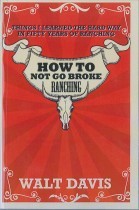Things I Learned the Hard Way in Fifty Years of Ranching
By Walt Davis
© 2011
There are few people who have more on the ground knowledge of ranching than Walt Davis. As an educator he has been generous in sharing that knowledge and now he’s made that knowledge more accessible to all by publishing a book.
provides context for ranching today as well as those lessons of Walt’s he references in the title. Lastly, he talks about where the ranching industry is today and how to pay attention to the factors that contribute to the profitability and stability of ranching and what to do about them. You may find some points that have been pointed out before in this publication and others (i.e. planned grazing is good for you, your animals, your land, and your wallet), but the devil is in the detail. Walt steps you through some of the key aspects of what makes for successful planned grazing and there’s nothing like shared experience to help you lessen a steep learning curve. This book has been a long time coming—Walt began thinking about this book when he began his management consulting business in 1974. Over the years his knowledge and experience on both his own ranch and with others has grown so that what you get with
, is really more than just Walt’s 50 years of ranching in Texas and Oklahoma. One of the aspects of this book that I appreciated the most was Walt’s evolution as a rancher. He started out doing conventional ranching and was open to new knowledge that would result in better returns. This is the hallmark of an astute business person and a lifelong learner. Paradigms such as all predators are bad are hard to shift, but Walt talks about his experience with coyotes and how his management toward predators has changed over the years. He asks the question: “To how many jackrabbits and packrats do you assure long life when you shoot a coyote?” The issue of unintended consequences articulated here can be most successfully avoided by another philosophical approach of Walt’s: “First do no harm; good advice for physicians and ranchers.” When it comes to the war on weeds Walt’s advice is: “The answer is not how to kill weeds but rather how to change conditions so that forages can compete effectively with the weeds.” This shift in a broader perspective is linked to his expanded interest in biodiversity and agriculture’s place in nature. As Walt puts it: “Agriculture should be the art and science of promoting life so we can harvest some of the surplus for our own use.” This book is a training manual on how to do just that. Every page has a succinct and clear nugget of advice and an explanation of how Walt learned to accomplish that outcome and how you can, too. Whether you have a large spread or a small ranch, if you run livestock,
will help you improve your long term profitability through managing toward a healthy soil-plant-animal complex.

